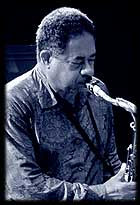
|
|
|
|
|
|
Photo Credit: Tim Owens |
Frank Wess
Throughout most of the 1950s and early 1960s, when one familiar with the Count Basie Orchestra requested "two Franks please," you can be sure they weren't ordering hot dogs. Those were the days when Frank Wess and Frank Foster anchored the saxophone section in a manner seldom repeated in the modern annals of the big band sound. On this show, Dr. Taylor welcomes one of the consummate saxophonists and gentlemen of jazz, Frank Wess. As might be expected when two Washingtonians like Frank and Billy get together to make music and conversation, spirits ran high on this fine evening in the capital. Though born in Kansas City, Frank Wess spent the bulk of his formative years in Washington. His first instrument was the alto saxophone, but the magnetism of the tenor sax proved too strong for Wess to resist adding to his arsenal. In between songs, Frank schools the audience on the irresistible charms of the tenor saxophone, while retracing some of his influences. He mentions one of the giants of the instrument, Lester "Pres" Young; "Pres" being short for his designation as president of the tenor sax. Wess' principle influences were saxophonists of the swing era. While playing with Basie, his buttery smooth tone made for interesting contrast with the more hurly-burly, bebop orientation of Frank Foster. In tandem, the two Franks propelled the Basie band to new heights. Wess also learned to become a superb team player while matriculating through several other big bands, including those of Blanche Calloway, Billy Eckstine, and Lucky Millinder. In addition to his skills on the alto and tenor saxes, Frank Wess is also notable for knowing his way around the flute, an instrument he began playing in 1949. When Dr. Taylor addresses Wess' flute playing, he engages the audience by explaining how he came play the woodwind instrument, then demonstrates a bit of his technique. Wess then indulges Dr. Taylor in explaining the difficulties of switching between instruments during a performance. After this discussion, Wess and Billy's trio proceed to warm the room with a lovely rendition of the classic "My Funny Valentine." Wess’ wide range of playing experiences are testament to his versatility and knowledge of jazz music. But when an audience member asks him to define the jazz language for the non-musician, the modest Mr. Wess skillfully hands off this somewhat open-ended query to Dr. Taylor. Billy explains that there are different "vocabularies" of the major periods in jazz, going as far back as ragtime and early New Orleans style, through swing, bebop, "cool", right up to jazz’s more recent manifestations. As usual, this Q&A portion of the program enlightens the audience while bringing them closer to Dr. Taylor's guests.
While Frank Wess' recording career is loaded with important dates with the Basie band and others, it also includes a fair share of band leadership dates. Billy asks Frank about his 1998 release on Concord Records called "Making My Blues Turn Green"—a title which elicits a chuckle from the audience. With obvious satisfaction, Wess
describes the recording of the rather unusual octet he assembled. Wess' beautifully crafted and swinging musical selections also pervade this program, including versions of such classics as the Brazilian piece by Antonio Carlos Jobim, "Wave", as well as the Duke Ellington Orchestra's first Latin foray, Juan Tizol's masterpiece "Caravan".
|
|
| |
